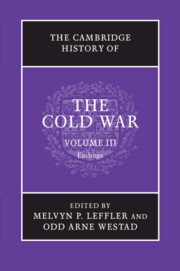Book contents
- Frontmatter
- 1 The Cold War and the intellectual history of the late twentieth century
- 2 The world economy and the Cold War, 1970–1990
- 3 The rise and fall of Eurocommunism
- 4 The Cold War and Jimmy Carter
- 5 Soviet foreign policy from détente to Gorbachev, 1975–1985
- 6 Islamism, the Iranian revolution, and the Soviet invasion of Afghanistan
- 7 The collapse of superpower détente, 1975–1980
- 8 Japan and the Cold War, 1960–1991
- 9 China and the Cold War after Mao
- 10 The Cold War in Central America, 1975–1991
- 11 The Cold War and southern Africa, 1976–1990
- 12 The Gorbachev revolution and the end of the Cold War
- 13 US foreign policy under Reagan and Bush
- 14 Western Europe and the end of the Cold War, 1979–1989
- 15 The East European revolutions of 1989
- 16 The unification of Germany, 1985–1991
- 17 The collapse of the Soviet Union, 1990–1991
- 18 Science, technology, and the Cold War
- 19 Transnational organizations and the Cold War
- 20 The biosphere and the Cold War
- 21 The Cold War and human rights
- 22 The Cold War in the longue durée: global migration, public health, and population control
- 23 Consumer capitalism and the end of the Cold War
- 24 An ‘incredibly swift transition’: reflections on the end of the Cold War
- 25 The restructuring of the international system after the Cold War
- Bibliographical essay
- Index
- References
1 - The Cold War and the intellectual history of the late twentieth century
Published online by Cambridge University Press: 28 September 2010
- Frontmatter
- 1 The Cold War and the intellectual history of the late twentieth century
- 2 The world economy and the Cold War, 1970–1990
- 3 The rise and fall of Eurocommunism
- 4 The Cold War and Jimmy Carter
- 5 Soviet foreign policy from détente to Gorbachev, 1975–1985
- 6 Islamism, the Iranian revolution, and the Soviet invasion of Afghanistan
- 7 The collapse of superpower détente, 1975–1980
- 8 Japan and the Cold War, 1960–1991
- 9 China and the Cold War after Mao
- 10 The Cold War in Central America, 1975–1991
- 11 The Cold War and southern Africa, 1976–1990
- 12 The Gorbachev revolution and the end of the Cold War
- 13 US foreign policy under Reagan and Bush
- 14 Western Europe and the end of the Cold War, 1979–1989
- 15 The East European revolutions of 1989
- 16 The unification of Germany, 1985–1991
- 17 The collapse of the Soviet Union, 1990–1991
- 18 Science, technology, and the Cold War
- 19 Transnational organizations and the Cold War
- 20 The biosphere and the Cold War
- 21 The Cold War and human rights
- 22 The Cold War in the longue durée: global migration, public health, and population control
- 23 Consumer capitalism and the end of the Cold War
- 24 An ‘incredibly swift transition’: reflections on the end of the Cold War
- 25 The restructuring of the international system after the Cold War
- Bibliographical essay
- Index
- References
Summary
In retrospect, the mid-1970s seem like the high point of what one might call the crisis of the West – or at least the high point of an acute consciousness of crisis in the West. The famous report to the Trilateral Commission claimed that European countries might be in the process of becoming ‘ungovernable’: the oil shock of 1973 had brought the trente glorieuses of unprecedented growth and social peace to a definitive end; the hitherto unknown phenomenon of stagflation – combining high unemployment and runaway inflation – seemed there to stay. In fact, the conservative German philosopher Robert Spaemann claimed that the oil shock was, from the point of view of intellectual history, the most important event since the Second World War. Domestic and international terrorism, from Right and Left, were on the rise; and, not least, the high levels of social mobilisation and political contestation that had begun in the late 1960s continued unabated.
The 1968 phenomenon had not in any narrow sense ‘caused’ large-scale social and cultural transformations, but ‘1968’ became shorthand for them. Because changes there were: a new quasi-libertarian language of subjectivity – foreshadowing the ‘me decade’ – and a new politics of individual life-styles. All over Europe, the traditional family came under attack – in some countries, such as Italy, for the first time. Students, the sons and daughters of the middle classes, who had been on the Right for most of the twentieth century (and highly active in the promotion of fascism in the 1920s and 1930s), all of a sudden were to be found on the Left.
- Type
- Chapter
- Information
- The Cambridge History of the Cold War , pp. 1 - 22Publisher: Cambridge University PressPrint publication year: 2010
References
- 3
- Cited by



